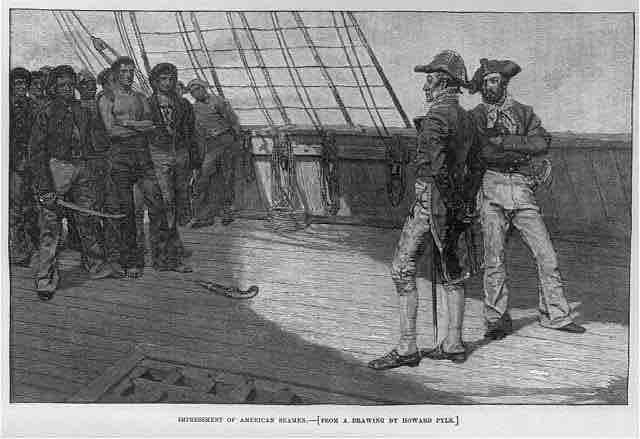The origins of the War of 1812, often referred to as the Second War of American Independence, are found in the unresolved issues between the United States and Great Britain. One major cause of conflict that remained unresolved by Jay's Treaty in 1794 was the British practice of impressment, whereby American sailors were taken at sea and forced to fight on British warships. In addition, the British in Canada supported American Indians in their fight against further U.S. expansion in the Great Lakes region. Though Jefferson wanted to avoid what he called “entangling alliances,” staying neutral would eventually prove impossible.
Impressment by the Royal British Navy
Impressment refers to the act of taking men into a navy by force and without notice. Beginning in 1664, the Royal British Navy used this practice in wartime, and during the eighteenth and early nineteenth centuries, impressment allowed the British to crew their warships. Although Britain practiced impressment before, during, and after the American Revolution, it most significantly affected the course of American history in the first decades of the republic.
Jay's Treaty, which went into effect in 1795, addressed many issues left unresolved after the American Revolution and helped avert a renewed conflict. However, many disapproved of the treaty's failure to address British impressment of sailors from American ships and ports. While non-British subjects were never impressed, Britain did not recognize naturalized American citizenship and therefore treated anyone born a British subject as British. As a result, the Royal Navy impressed more than 9,000 sailors who claimed American citizenship.
Increasing Tensions
During the United Kingdom's wars with Revolutionary and Napoleonic France (1793 to 1815), the Royal Navy aggressively reclaimed British deserters on board ships of other nations, both by halting and searching merchant vessels and, in many cases, by searching American port cities. Although this was illegal, Thomas Jefferson ignored the actions to remain on good terms with Britain as he was negotiating to obtain East and West Florida. This changed in 1805, however, when the British began seizing American merchantmen trading with the West Indies, claiming the ships and their cargoes as a prize, and enforcing impressment on the vessels' crews. This eventually resulted in the blockade of New York Harbor by two British frigates, the HMS Cambrian and the HMS Leander, which provoked public demonstrations. Over the following year, scores of American ships were condemned in admiralty courts and American seamen were impressed with increasing frequency.
The Chesapeake-Leopard Affair
The Chesapeake-Leopard Affair was a naval engagement that occurred off the coast of Norfolk, Virginia, on June 22, 1807, between the British warship HMS Leopard and the American frigate USS Chesapeake. The crew of the HMS Leopard pursued, attacked, and boarded the American frigate looking to impress deserters from the Royal Navy. The USS Chesapeake was caught unprepared, and after a short battle involving broadsides from the HMS Leopard, Commander James Barron surrendered his vessel to the British after firing only one shot. Of the four crew members removed from the American vessel and tried for desertion, one was subsequently hanged.
The Chesapeake-Leopard Affair created an uproar among Americans and strident calls for war with Great Britain, but these quickly subsided. President Thomas Jefferson initially attempted to use this widespread attention to diplomatically threaten the British government into settling the matter. However, when British envoys showed no contrition for the Chesapeake-Leopard Affair and delivered proclamations reaffirming impressment, the U.S. Congress backed away from armed conflict.
Jefferson's political failure to coerce Great Britain led him toward economic warfare in the form of the Embargo of 1807. The festering crisis of impressment and the Chesapeake-Leopard Affair contributed to the eventual outbreak of the War of 1812 and triggered serious diplomatic tensions that helped turn American public opinion against Britain.

Impressment at sea
A British naval officer looks for deserters among a surly American crew in this 1884 drawing.